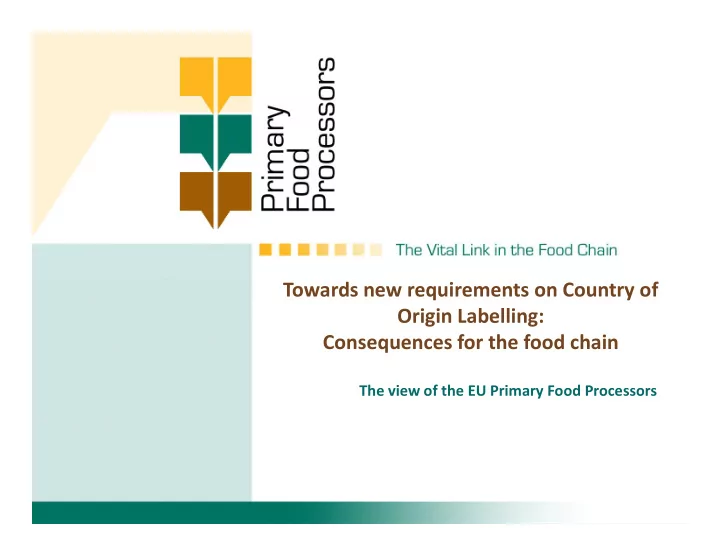

Towards new requirements on Country of Towards new requirements on Country of Origin Labelling: Consequences for the food chain The view of the EU Primary Food Processors
From farmer’s gates to shelves PFP is the vital link in the EU food chain Producing high-quality and safe primary food to European Consumers Liaising with the chain partners sharing best practices developing a sustainable and competitive EU industry
The EU Primary Food Processors (PFP) • 3 130 companies in 26 EU Member States • 123 500 persons employed • Over 60 billion euro turnover • Supplying sugar, flour, vegetable oil, starch products, vegetable protein, cocoa-based products & other food ingredients like lecithin, protein meals, feed food ingredients like lecithin, protein meals, feed materials to variety of industries
Everything starts with the raw materials… Over 220 m tonnes of agricultural raw materials processed per year, from EU and non-EU origin, of which: 100 mil. tonnes of sugar beets 52 mil. tonnes of wheat and rye 22 mil. tonnes of rapeseeds 14 mil. tonnes of soybeans 14 mil. tonnes of soybeans 7.5 mil. tonnes of starch potatoes 7.1 mil. tonnes of maize 6 mil. tonnes of sunflower seed 1 mil. tonnes of cocoa beans 0.5 mil. tonnes of linseed
Why is PFP impacted ? EU Primary Food Processors manufacture: → Single-ingredient products (art. 26(5)(e) of Reg. 1169/2011) → Ingredients representing more than 50% of a food (art. (26)(5)(f) of Reg. 1169/2011) (art. (26)(5)(f) of Reg. 1169/2011)
Why is PFP impacted ? Mandatory origin labelling for single ingredient products and ingredients representing more than 50% of a food is not economically viable for EU 50% of a food is not economically viable for EU Primary Food Processors
Origin labelling T RACEABILITY goes beyond traceability R AW M ATERIAL � EU Primary Food Processors ensure traceability for incoming raw material and outgoing foods (General Food Law principle) F ACTORY F ACTORY � For bulk commodity businesses, blending is � For bulk commodity businesses, blending is ( BLENDING ) a key step in the process � Traceability of incoming raw material does not require segregation of raw material per T RACEABILITY origin throughout the process F INAL I NGREDIENT
From raw material to food - TODAY Raw Material Raw Material Raw Material Raw Material Origin (country X) Origin (country Y) Origin (country Z) Origin (country …) Storage Process Step 1 Intermediate Storage (if required) Process Step 2 Storage final ingredients / food Packaging and Labelling Transport
From raw material to food - TOMORROW Raw Material Raw Material Raw Material Origin Country X Origin Country Y Origin Country (…) (or EU) (or non-EU) Z Storage Storage Storage Process Step 1 Process Step 1 Process Step 1 Intermediate Storage Intermediate Storage Intermediate Storage Intermediate Storage Intermediate Storage Intermediate Storage (if required) (if required) (if required) (…) Process Step 2 Process Step 2 Process Step 2 Storage final Storage final Storage final ingredients ingredients ingredients Packaging and Packaging and Packaging and Labelling Labelling Labelling Transport Transport Transport
Impact on sourcing Will take away the flexibility to deviate and/or differentiate sourcing: • Seasonal variability • Seasonal variability • Weather/climate variation • Raw material quality • Raw material price
Impact on storage Will impact the functioning of the current supply chain for storage: • Additional silos, tanks,… • Separate transport logistics • Additional handling and administration
Impact on processing Processing bulk agricultural commodities is a continuous production process � Hence, it will impact the functioning of current processing by either: processing by either: Requiring additional process lines per origin • Requiring dedicated single origin production • line / plant Interruption of process (batch) • � Loss of productivity and competitiveness
Impact on labelling Will impact the functioning of the current supply chain for labelling: • require constantly adapting labels
Impact on internal and international markets Customers may request a “preferred” sourcing leading to: • segmentation of the market • change of trade flows • change of trade flows • raw material prices and potential market disruptions • increased uncertainty in security of supplies
Impact on environment Will increase the environmental footprint of PFP foodstuffs: • Additional transport • Additional transport • Additional waste • Increased energy use (process) • Additional cleaning
Impact on consumers Origin indication on PFP foodstuffs could Origin indication on PFP foodstuffs could be misleading consumers, by wrongly suggesting that they possess special characteristics / quality
Conclusion The EU Primary Food Processors support keeping the current EU voluntary origin labelling rules voluntary origin labelling rules
Thank You! www.pfp-eu.org
Recommend
More recommend